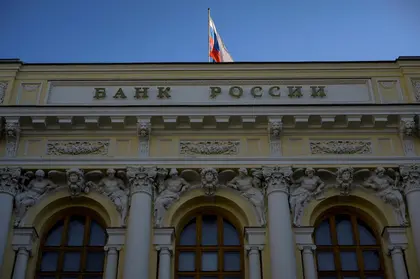On Saturday April 20, the US House of Representatives passed a bill on Repurposing of Russian Sovereign Assets with the overwhelming majority of 360 against 58. It states that the President shall transfer Russian state assets in the United States to a Ukraine Support Fund. The European Union should follow this example.
This well-written bill notes that the leaders of the G7 have called Russia’s “unprovoked and completely unjustified attack on the democratic state of Ukraine” a “serious violation of international law and a grave breach of the United Nations Charter and all commitments Russia entered in the Helsinki Final Act and the Charter of Paris and its commitments in the Budapest Memorandum.”
JOIN US ON TELEGRAM
Follow our coverage of the war on the @Kyivpost_official.
It cites various UN General Assembly condemnations of Russia’s Aggression against Ukraine and the March 2022 International Court of Justice provisional verdict ordering Russia to “immediately suspend the military operations” in Ukraine. On Nov. 14, 2022, the UN General Assembly recognized the need for the establishment of an international mechanism financially compensating Ukraine for the damage caused by Russia.
The Congress concludes that Russia “bears responsibility for the financial burden of the reconstruction of Ukraine and for countless other costs associated with the illegal invasion of Ukraine.” Furthermore, at least since November 2022 Russia “has been on notice of its opportunity to comply with its international obligations, including to make full compensation.”

EXPLAINED: What We Know About Russia’s Oreshnik Missile Fired on Ukraine
Some $300 billion of Russian sovereign assets have been immobilized worldwide, but only $4-5 billion are supposed to be in the United States. Most Russian sovereign assets, some $190 billion, are located in Belgium. This law the United States sets an example, but it has almost no Russia assets. It calls on the president to “seize, confiscate, transfer or vest any Russian aggressor sovereign assets” to a “Ukraine Support Fund” to be established, which in turn will be used for assistance to Ukraine.
The law calls for international action. It orders the President to act together with “the G7, the European Union, Australia and other partners” to seize their Russian sovereign assets and establish an international Ukraine Compensation Fund “to compensate Ukraine for damages caused by Russia’s internationally wrongful acts.”
The US legislation has clarified that no international law hinders the confiscation of state assets of a war criminal, such as Russia. On the contrary, war criminals have to pay war reparations, as the United Nations has repeatedly insisted. Now, it is time for the EU to act.
The real reason for European resistance is probably the many financial interests that thrive on captive Russian funds, which is not an acceptable argument.
Strangely, the main European resistance against the confiscation of Russian state assets comes from Cristine Lagarde, the President of the European Central Bank, who claims that it might undermine the euro. But the Russian reserves have been frozen for more than two years and the proportions of international currency reserves have not changed – 60 percent US dollars and 20 percent euro. There is no competition.
A reserve currency must be based on a big economy with a stable and convertible currency and strong rule of law. Moreover, the West should not see as its purpose to serve authoritarian kleptocracies. The real reason is probably the many financial interests that thrive on captive Russian funds, which is not an acceptable argument.
Not surprisingly, Putin’s spokesman Dmitry Peskov praises Lagarde: “The most eloquent call for a more sober consideration of such issues came from Mrs. Lagarde, who said that a potential decision of this kind could lead to the collapse of the existing economic system.”
He claimed that the seizure of Russian assets in the United States will lead to countermeasures and litigation and will deal a strong blow to US economic interests. “This in no way can be viewed as some kind of legal actions. They are illegal, and accordingly, they will one way or another be the subject of some kind of retaliatory actions and litigation.”
Since Peskov always lies, his statement can be read as his insight that Lagarde is wrong. Peskov proceeded that the Kremlin feels “extremely negative” about the planned seizure of Russian assets, as this is “nothing but the destruction of every foundation of the economic system, this is an encroachment on state property, on state assets, and on private property.” But Peskov considers wars of aggression and genocide legitimate.
Like other lawless Russians, Peskov threatens to sue. Private oligarchs do so successfully, but the Russian state is helpless in legal matters, since it is a persistent violator of most laws. European constitutions do not protect state ownership.
Russia has departed from the European Court of Human Rights, because it lost thousands of cases there and refused to enforce the verdicts. The only relevant court that remains for the Russian Federation is the International Court of Justice in The Hague, which has already passed a negative verdict on Russia, but Russia has refused to comply.
It is time for the EU to follow the US and Canadian lead and legislate the confiscation of all Russian state assets in Europe to the benefit of Ukraine.
The views expressed in this opinion article are the author’s and not necessarily those of Kyiv Post.
You can also highlight the text and press Ctrl + Enter






